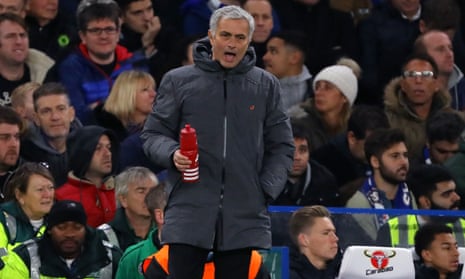The memories of Manchester United in 1985-86 and Newcastle United in 1995-96 serve always as caveats, but already it feels that it would take something outlandish for Manchester City not to be named as champions this season. Perhaps their slick cogs and gears will somehow stick or grind, but at the moment none of the chasing pack are applying pressure. The gap already is eight points and, once again, on Sunday, it was hard to avoid the thought that there has been something meek in the way José Mourinho has presented the initiative to his rivals.
When United defeated Ajax to win the Europa League, Mourinho spoke of it as a victory for pragmatism. It is a term that is frequently applied to his football, and football generally has a tendency to use pragmatic as a synonym for defensive. But they are not the same: a pragmatist does what is necessary to win; Mourinho insists on reactive football again and again, even when it means losing ground. The three games in the past month against top-six sides were always likely to represent a decisive phase of the season. In them United totalled six shots on target – and that suggests an approach that is not pragmatic, but is rather stubbornly dogmatic.
Yes, this was Chelsea and, yes, they are the defending champions. But City came to Stamford Bridge, dominated the game and won 1-0. United, frankly, never looked like winning. They were not as defensive as they had been in the FA Cup tie here last season when they fielded a back six, but nor was there ever a thought of them taking the game to Chelsea as Pep Guardiola had, of trying to expose a defence that had been given such a tough time in recent games by Roma (twice) and Watford.
Chelsea with N’Golo Kanté, admittedly, are a different proposition to Chelsea without him, and there was no question that Antonio Conte’s side improved with his return after injury. But still, it was hard to see how United ever planned to hurt Chelsea.
Early on, as Ander Herrera was lured towards Eden Hazard, Tiémoué Bakayoko, playing on the left of Chelsea’s midfield triangle, kept finding space to charge into. Which might in itself have been decisive had he not been Tiémoué Bakayoko and therefore lacking the composure that might have turned those opportunities into goals. That avenue, though, was soon closed down, with Phil Jones and, particularly, Eric Bailly stepping out to close down Hazard, leaving Herrera to block the channel Bakayoko had been exploiting.
The use of a back three gave United the option of pushing one of the central defenders out to deal with Hazard and preventing just that problem, but the issues that had cropped up against Tottenham Hotspur last week recurred. Much was played long to the two forwards, which effectively diminished Henrikh Mkhitaryan’s role to the point that he may as well not have been there. The Armenian’s 62 minutes on the pitch yielded just 29 touches – although that was at least five more than an isolated Romelu Lukaku managed in a full game.
And then there was the issue of the midfield. Even excluding Hazard, who occasionally dropped deep, Chelsea had three central midfielders there. United had two plus Mkhitaryan, which meant they were occasionally overmanned, a problem exacerbated by the fact that Chelsea’s wing-backs were, understandably, more aggressive. That was what led to the first Bakayoko chance, as Davide Zappacosta got in behind Ashley Young, and it was a shortfall on that flank that led to the goal. Young was forced deep to prevent Zappacosta making a similar run behind him and as Chelsea switched the ball quickly from their left to right, César Azpilicueta was able to stride forward into space and measure his cross for Álvaro Morata.
Mourinho almost immediately changed tack, went to a 4-3-3, and United became more threatening as a result, while suddenly becoming vulnerable again to those Bakayoko surges. Marouane Fellaini, back after a knee injury, spread the kind of chaos he always does, and nearly equalised. But, whatever absentees United have – Mourinho once again reluctantly listed the injured Paul Pogba, Zlatan Ibrahimovic and Marcos Rojo – it remains bewildering that United can seem so reliant on the Belgian bag of elbows for anything approximating to creativity.
United, in fairness, were probably more proactive here than they had been against either Liverpool or Tottenham. But in the context of dropped points against Liverpool and Huddersfield, it was not enough.

Comments (…)
Sign in or create your Guardian account to join the discussion